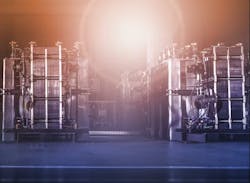Argonne and Idaho National Laboratory Partner with CMBlu Energy to Validate Long-Duration Energy Storage System
The U.S. Department of Energy’s (DOE) Argonne National Laboratory and Idaho National Laboratory (INL) have been selected for a demonstration project to validate a long-duration energy storage system developed by battery manufacturer CMBlu Energy to improve microgrids in cold climates and make fast charging of electric vehicles more affordable in underserved communities.
Argonne and INL will deploy and evaluate CMBlu Energy’s Organic SolidFlow battery technology during the process.
The materials used in the construction of these batteries are non-metallic and abundant to build resilient and domestic supply chains. The batteries are targeted for community, industrial, and utility-scale applications of medium and long duration.
The project aims to provide valuable insights into microgrids, which are often used in remote or critical infrastructure settings. It is expected to strengthen the resilience of microgrids with a constant power supply, even during extended outages or fluctuations in the main grid.
Owing to the project, the fast charging of electric vehicles will be more affordable in rural and underserved communities with reduced charging facility installation and operational costs.
In the Midwest, Argonne researchers plan to demonstrate the effectiveness of CMBlu’s batteries at the lab’s Smart Energy Plaza, while researchers will conduct performance tests like assessing the Organic SolidFlow batteries at different temperatures at the INL Battery Test Center in Idaho to ensure the technology's reliability in diverse environments.
Illinois Alliance for Clean Transportation, Electric Power Research Institute (EPRI), Jensen Hughes, Drive Clean Indiana, and National Grid are additional project partners.
About the Author
EnergyTech Staff
Rod Walton is head of content for EnergyTech.com. He has spent 17 years covering the energy industry as a newspaper and trade journalist.
Walton formerly was energy writer and business editor at the Tulsa World. Later, he spent six years covering the electricity power sector for Pennwell and Clarion Events. He joined Endeavor and EnergyTech in November 2021.
He can be reached at [email protected].
EnergyTech is focused on the mission critical and large-scale energy users and their sustainability and resiliency goals. These include the commercial and industrial sectors, as well as the military, universities, data centers and microgrids.
Many large-scale energy users such as Fortune 500 companies, and mission-critical users such as military bases, universities, healthcare facilities, public safety and data centers, shifting their energy priorities to reach net-zero carbon goals within the coming decades. These include plans for renewable energy power purchase agreements, but also on-site resiliency projects such as microgrids, combined heat and power, rooftop solar, energy storage, digitalization and building efficiency upgrades.
